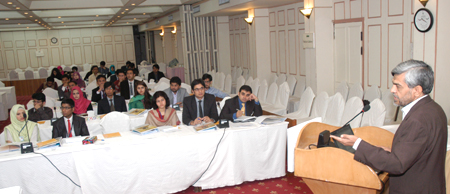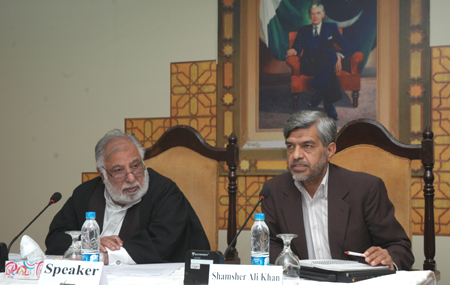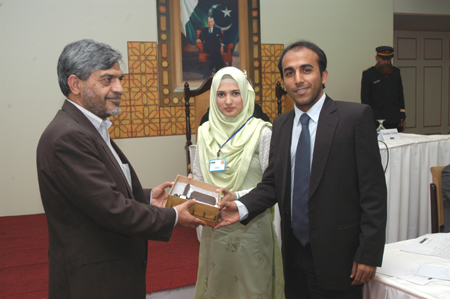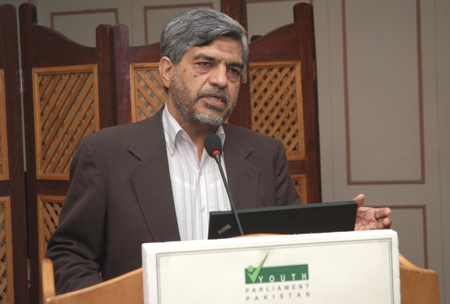|
|
| |
| EVENTS |
|
|
> Youth of Pakistan should support efforts of polio Eradication: Youth Parliament Pakistan briefed
|
|
|
| |
February 27; The support of youth of Pakistan is critical for eradicating Polio from Pakistan, said Dr. Shamsher Khan, Coordinator High-Risk Districts, UNICEF, while addressing the Youth Parliament of Pakistan today. |
|
| |
Dr. Shamsher Khan was addressing the newly-inducted 5th batch of Youth Parliament Pakistan 2013 on the importance of understanding and support of youth on the challenges of polio eradication in Pakistan.
|
|
| |
Youth Parliament Pakistan (www.youthparliament.pk) is a PILDAT initiative. It is patterned after the National Assembly of Pakistan and its selected members, 60 in total, engage in Parliamentary business including debate on important national issues, legislation, and overseeing and scrutinising key national policies from the youth�s perspective. PILDAT formed the first-ever Youth Parliament Pakistan in the year 2007. After the successful completion of the four batches of Youth Parliament in 2007, 2008, 2009 and 2012, the 5th batch of the Youth Parliament Pakistan has been selected from across the country and began its first session on February 25, 2013. Youth Parliament Steering Committee comprises veteran and young members of Pakistan�s Parliament including Senator S. M. Zafar as chairman, while the other members include Honourable Mr. Faisal Karim Kundi, MNA, Deputy Speaker National Assembly of Pakistan as Patron Youth Parliament Pakistan; Mr. Wazir Ahmed Jogezai, Former Deputy Speaker, National Assembly of Pakistan; Engr. Khuram Dastgir Khan, MNA, Chairman, National Assembly Standing Committee on Commerce; Ms. Anusha Rahman Khan, MNA, Member, National Assembly Standing Committee on Law, Justice and Parliamentary Affairs, Secretary Young Parliamentarians Forum; Mr. Nadeem Afzal Gondal, Chairman Public Accounts Committee and Mr. Ahmed Bilal Mehboob, President PILDAT. |
|
| |
A briefing on Polio Eradication in Pakistan was facilitated by PILDAT to orient young members to the challenges of polio eradication in Pakistan. |
|
| |
Dr. Shamsher Khan said that since the start of the programme in 1994, number of polio cases have markedly decreased in Pakistan. A house to house strategy was adopted in the year 2000 for reaching young infants and additional technical support at the district level was provided in the same year to ensure a certification standard surveillance system. This resulted in a fruitful progress and a decrease in cases. He added that 2002-03 saw a leveling-off of progress which was addressed by the introduction of intensified and targeted activities in high risk communities and areas identified through surveillance system. Since then there is further reduction in cases every year indicating continued progress. |
|
| |
Depicting the current scenario, he stated that globally, there has been a decline in polio cases over the years. In Pakistan, as of 2013, two cases have been reported from all over the country so far. In the Federally-Administered Tribal Areas (FATA), despite significant proportion of total number of cases, there has been reduction of cases by 66% compared to 2012. Cases in Khyber Pakhtunkhwa (KP) have increased by 17% compared to 2011 due to a major outbreak (that included FATA) during the second half of the year. A total of 58 polio cases were reported in 2012. 47 (81%) of cases were reported from KP (46%) and FATA (35%) whereas Balochistan, Sindh, and Punjab had significant reduction in the number of cases in 2012 compared to 2011 (95%, 88%, and 78% respectively). |
|
| |
An Augmented National Emergency Action Plan (NEAP) to deal with polio in Pakistan has been drafted. The plan focuses on involving public representatives to help eradicate polio in their constituencies. He shared that while there has been a positive change through personal oversight by chief executives at the national, provincial and district levels, a key challenge of translation of high-level commitment into meaningful accountability at the UC-level still remains. One of key objectives of NEAP 2013 therefore is to have �meaningful accountability at district & UC level.� The NEAP 2013, he shared, focuses, among other things, on �priority underserved Pashtun, migrant and transit populations� aims to track and vaccinated all missed children. He added that it will also ensure to have effective and integrated control rooms at all levels. |
|
| |
While answering the questions of Members of Youth Parliament Pakistan, Dr. Shamsher Khan said that the key strategies for the eradication of polio in 2013 include Short Interval Additional Doses; Focus on Priority underserved Pashtun, migrant and transit populations; All missed children to be tracked and vaccinated after each campaign; Effective and integrated control rooms at all levels; Strengthening Pre & intra campaign monitoring; Zero tolerance for misreporting & financial misappropriation; Direct Disbursement Mechanism � 225,000 polio workers and Improving vaccine management. |
|
| |
Addressing the Roundtable, Mr. Ahmed Bilal Mehboob, President PILDAT, said that PILDAT organized the Briefing Session to facilitate an understanding among the young members on the need to tackle the menace of polio. He also asked young members to study the PILDAT Briefing Paper on Polio Eradication: a National Emergency in Pakistan which can be accessed at http://www.pildat.org/Publications/publication/PublicHealth/
PolioEradicationANationalEmergencyinPakistan_Nov2012.pdf
The briefing on Polio Eradication Initiative to Youth Parliament Pakistan in association with UNICEF, Pakistan under the Project on �To Raise Awareness among Parliamentarians to Enhance the Effectiveness of Anti-Polio.� |
|
| |
|
|
| |

|
|
| |
|
|
| |

|
|
| |
|
|
| |

|
|
| |
|
|
| |

|
|
|
|
|
|
|
|
|